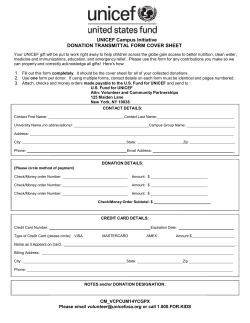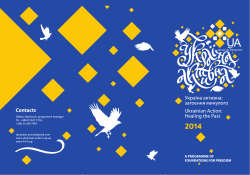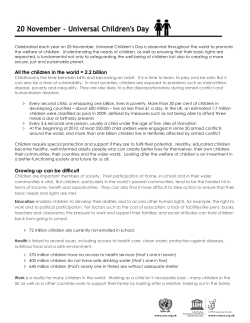
Terms of Reference for Individual Contract (national)
Terms of Reference for Individual Contract (national) Enhancing multi sector dialogue on child-centered and community based WASH activities in Laamu Atoll Reference Number: TOR/2014/21 1. Purpose of assignment (attach background documents if any) Background The Republic of Maldives is highly vulnerable to climate change due to its low-lying geography that makes it susceptible to flooding and inundation, and its dependence on economic activities that are sensitive to climate change, such as fishing and tourism. It is also highly dependent on imported fossil fuels for its energy supply and this represents a major source of greenhouse gas emissions for the country. Consequently, the Maldives has made significant commitments to the pursuit of a low emission climate resilient development agenda. However, ongoing decentralization reforms, fiscal crisis and low capacity at the sub-national level, mean that local planning is not reflective of national level commitments. The 3 year, US$9.2 million UN Joint Programme, "Low Emission and Climate Resilient Development" (LECReD), responds to the United Nations Development Assistance Framework Outcome 9: “Enhanced capacities at national and local levels to support low carbon life-styles, climate change adaptation, and disaster risk reduction” and builds on the comparative strengths of United Nations Organizations including UNDP, UNICEF, UNOPS, UNFPA, UN WOMEN, WHO and FAO. The programme is innovative and represents a pioneering initiative of bringing together the wealth of diverse development-oriented expertise from these United Nations Organizations with equally diverse national and local partners to address this multi-faceted development challenge. The programme will assist the Laamu Atoll and its islands to realize low emission and climate resilient development (LECReD). The programme seeks to mainstream LECReD issues into local level development planning and service delivery for greater community-level ownership and sustainability of programme benefits. Towards this objective, the programme will support local councils, civil society, private sector and other local stakeholders to establish platforms for stronger partnerships, improved coordination, and enhanced participation in local planning for LECReD; it will strengthen data and knowledge systems for LECReD; improve local level LECReD development planning and management of service delivery; and through a learning-by-doing approach establish early lessons and build demand for LECReD planning and management for replication and scaling-up. The aim is that the local development plans will evolve from stand-alone action plans into more strategic and evidence-based instruments, which are climate smart and able to mobilize public and private investment. This programme will be closely linked to the existing national development planning cycle and will build capacity of local and national partners engaged in these local processes. The rationale being that lessons learned will be used to inform replication throughout the country and directly support the national agenda. In pursuit of the core objective, the programme will achieve the following outputs: Output 1: Partnership, coordination and participation platform for local LECReD planning and action is strengthened; Output 2: Data and knowledge systems established or identified to support evidence-based planning and policy development for LECReD at the local level; Output 3: Improved Local Level Planning and Management for LECReD; Output 4: Practical local experience in LECReD’s interventions lead to learning and promote replication All the above outputs contribute to the different UN Agencies work under the One UN Joint Programme of LECReD. UNICEF’s area of contribution for this consultancy falls under output 1 as described above to support and enhance multi sector dialogue between island, and between local and national levels on child-centered and community-based water, sanitation and hygiene activities in Laamu Atoll. 2. Duty station Laamu Fonadhoo, Laamu Atoll 3. Major tasks to be accomplished (estimate the time required to complete each task) 1. Support development of training materials for community based dialogue facilitation on WASH 2. Support the preparatory information gathering for the communities, including conducting preliminary trips to communities to hold separate and joint meetings with different groups 3. Facilitate workshops in target communities to provide space for communities to discuss issues and generate information on what are the underlying WASH issues within the communities 4. With support of identified local trainers and LECReD Laamu Working Group , conduct capacity building for community dialogue sessions for selected communities using the training materials developed 5. Provide reports and analysis of trainings/consultations to document and revise capacity building and community dialogue approach and strategies 6. Deliverables Technical guidance provided for developing training materials, in consideration of current practices of community consultation and dialogue Preparatory information gathered and documented prior to dialogue activities in the communities Training and facilitation provided for capacity building and community consultations and dialogues in selected atolls/islands Recommendations and support provided on follow up reviews and revisions of capacity building and community dialogue methodologies in light of experiences in communities Field reports from the island visits, including analysis of trainings and consultations/dialogues with recommendations for revisions/adaptations if required 7. Estimated duration of contract and deadline for submission of end-product It is estimated that the consultant will work up to 16 weeks in total Development of training materials Three weeks Facilitation of dialogue Four weeks Capacity building activities Five weeks Follow up action plan Two weeks Field reports and end of mission report Two weeks 8. Official travel involved (itinerary and duration) The consultant will be based in Laamu Atoll (DSA and travel will be provided based on actuals) Qualifications or specialized knowledge and/or experience required Qualifications: Substantial field and academic experience working on issues related to community development and capacity building in the area of WASH University degree in social sciences or relevant area of study Demonstrated experience in facilitating dialogue and training including the development and delivery of training materials. Strong writing and communication skills Proven ability to work independently Willingness to travel Ability to work in a team environment Deadline for applications is 18 October 2014. Applications with updated CVs can be emailed to muaahmed@unicef.org with a copy to aguraisha@unicef.org; OR forwarded under confidential cover to “Operations Officer, UNICEF, Mookai Suites – 9th Floor, 904-905, Male’, Maldives” with the TOR number on the envelope
© Copyright 2025





















